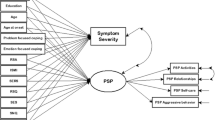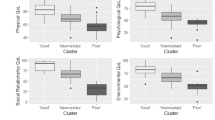Abstract
Despite much effort to positively affect long-term outcome in psychosis and schizophrenia many patients are still facing a poor outcome with persistent psychotic symptoms and decline in social functioning. The aim of this study was to examine the relationship between financial strain and social network and five-year outcome of first episode psychosis (FEP). FEP patients were divided into recovered (n = 52) and non-recovered (n = 19). Each person was matched according to age and gender with four persons (n = 284) from a longitudinal population-based study. All persons had answered an extensive questionnaire including social network, quantitative and qualitative, financial strain and mental health. Linear regression analysis showed that both financial strain and social network were associated, and had a unique contribution, to outcome. The results indicate that FEP patients might benefit from interventions that reduce financial strain thus facilitating daily life and cultural and social activities.
Similar content being viewed by others
References
Addington J, Leriger E, Addington D (2003) Symptom outcome 1 year after admission to an early psychosis program. Can J Psychiatry 48:204–207
Addington J, van Mastrigt S, Addington D (2003) Patterns of premorbid functioning in first-episode psychosis: initial presentation. Schizophr Res 62:23–30
APA (1994) Diagnostic and statistical manual of mental disorders, DSM-IV (4th edn). American Psychiatric Association, Washington, DC
Borg M, Davidson L (2007) The nature of recovery as lived in everyday experience. Accepted for publication in J Ment health
Borg M, Sells D, Topor A, Mezzina R, Maria I, Davidson L (2005) What makes a house a home: the recovery from severe mental illness. Am J Psych Rehabil 8:243–256
Carlsson R, Nyman H, Ganse G, Cullberg J (2006) Neuropsychological functions predict 1- and 3-year outcome in first-episode psychosis. Acta Psychiatr Scand 113:102–111
Cullberg J, Levander S, Holmqvist R, Mattsson M, Wieselgren IM (2002) One-year outcome in first episode psychosis patients in the Swedish parachute project. Acta Psychiatr Scand 106:276–285
Davidson L, Haglund KE, Stayner DA, Rakfeldt J, Chinman MJ, Tebes JK (2001) It was just realizing ... that life isn’t one big horror”: a qualitative study of supported socialization. Psychiatr Rehabil J 24:275–292
Davidson L, Shahar G, Stayner AS, Chinman MJ, Rakfeldt J, Kraemer Tebes J (2004) Supported socialization for people with psychiatric disabilities: lessons from a randomized controlled trial. J Community Psychol 32:453–477
de Haan L, Linszen DH, Lenior ME, de Win ED, Gorsira R (2003) Duration of untreated psychosis and outcome of schizophrenia: delay in intensive psychosocial treatment versus delay in treatment with antipsychotic medication. Schizophr Bull 29:341–348
Dean K, Murray RM (2005) Environmental risk factors for psychosis. Dialogues Clin Neurosci 7:69–80
DeLisi LE, Stritzke P, Riordan H, Holan V, Boccio A, Kushner M, McClelland J, Van Eyl O, Anand A (1992) The timing of brain morphological changes in schizophrenia and their relationship to clinical outcome. Biol Psychiatry 31:241–254
Emsley R, Oosthuizen PP, Kidd M, Koen L, Niehaus DJ, Turner HJ (2006) Remission in first-episode psychosis: predictor variables and symptom improvement patterns. J Clin Psychiatry 67:1707–1712
Endicott J, Spitzer RL, Fleiss JL, Cohen J (1976) The global assessment scale. A procedure for measuring overall severity of psychiatric disturbance. Arch Gen Psychiatry 33:766–771
Erickson DH, Beiser M, Iacono WG (1998) Social support predicts 5-year outcome in first-episode schizophrenia. J Abnorm Psychol 107:681–685
Erickson DH, Beiser M, Iacono WG, Fleming JA, Lin TY (1989) The role of social relationships in the course of first-episode schizophrenia and affective psychosis. Am J Psychiatry 146:1456–1461
Evert H, Harvey C, Trauer T, Herrman H (2003) The relationship between social networks and occupational and self-care functioning in people with psychosis. Soc Psychiatry Psychiatr Epidemiol 38:180–188
Flyckt L, Mattsson M, Edman G, Carlsson R, Cullberg J (2006) Predicting 5-year outcome in first-episode psychosis: construction of a prognostic rating scale. J Clin Psychiatry 67:916–924
Gupta S, Andreasen NC, Arndt S, Flaum M, Hubbard WC, Ziebell S (1997) The Iowa longitudinal study of recent onset psychosis: one-year follow-up of first episode patients. Schizophr Res 23:1–13
Hafner H (2003) Gender differences in schizophrenia. Psychoneuroendocrinology 28(Suppl. 2):17–54
Hallstrom T, Damstrom Thakker K, Forsell Y, Lundberg I, Tinghog P (2003) The PART study: a population based study of mental health in the Stockholm County: study design. Phase 1. In: Centre for Public Health—Karolinska Institute, Sweden
Harris MG, Henry LP, Harrigan SM, Purcell R, Schwartz OS, Farrelly SE, Prosser AL, Jackson HJ, McGorry PD (2005) The relationship between duration of untreated psychosis and outcome: an eight-year prospective study. Schizophr Res 79:85–93
Harvey CA, Jeffreys SE, McNaught AS, Blizard RA, King MB (2007) The camden schizophrenia surveys. III: five-year outcome of a sample of individuals from a prevalence survey and the importance of social relationships. Int J Soc Psychiatry 53:340–356
Isaac M, Chand P, Murthy P (2007) Schizophrenia outcome measures in the wider international community. Br J Psychiatry 191:71–77
Jarbin H, Ott Y, Von Knorring AL (2003) Adult outcome of social function in adolescent-onset schizophrenia and affective psychosis. J Am Acad Child Adolesc Psychiatry 42:176–183
Jobe TH, Harrow M (2005) Long-term outcome of patients with schizophrenia: a review. Can J Psychiatry 50:892–900
Larsen TK, Friis S, Haahr U, Joa I, Johannessen JO, Melle I, Opjordsmoen S, Simonsen E, Vaglum P (2001) Early detection and intervention in first-episode schizophrenia: a critical review. Acta Psychiatr Scand 103:323–334
Larsen TK, Moe LC, Vibe-Hansen L, Johannessen JO (2000) Premorbid functioning versus duration of untreated psychosis in 1 year outcome in first-episode psychosis. Schizophr Res 45:1–9
Leung A, Chue P (2000) Sex differences in schizophrenia, a review of the literature. Acta Psychiatr Scand Suppl 401:3–38
Lundberg I, Damstrom Thakker K, Hallstrom T, Forsell Y (2005) Determinants of non-participation, and the effects of non-participation on potential cause-effect relationships, in the PART study on mental disorders. Soc Psychiatry Psychiatr Epidemiol 40:475–483
Malla A, Norman R, Schmitz N, Manchanda R, Bechard-Evans L, Takhar J, Haricharan R (2006) Predictors of rate and time to remission in first-episode psychosis: a two-year outcome study. Psychol Med 36:649–658
Malla AK, Norman RM, Manchanda R, Townsend L (2002) Symptoms, cognition, treatment adherence and functional outcome in first-episode psychosis. Psychol Med 32:1109–1119
Manchanda R, Malla A, Harricharan R, Cortese L, Takhar J (2003) EEG abnormalities and outcome in first-episode psychosis. Can J Psychiatry 48:722–726
Marshall M, Lewis S, Lockwood A, Drake R, Jones P, Croudace T (2005) Association between duration of untreated psychosis and outcome in cohorts of first-episode patients: a systematic review. Arch Gen Psychiatry 62:975–983
Marshall M, Lockwood A (2004) Early intervention for psychosis. Cochrane Database Syst Rev:CD004718
Marwaha S, Johnson S (2004) Schizophrenia and employment—a review. Soc Psychiatry Psychiatr Epidemiol 39:337–349
Mattsson M, Lawoko S, Cullberg J, Olsson U, Hansson L, Forsell Y (2005) Background factors as determinants of satisfaction with care among first-episode psychosis patients. Soc Psychiatry Psychiatr Epidemiol 40:749–754
McCabe R, Priebe S (2004) The therapeutic relationship in the treatment of severe mental illness: a review of methods and findings. Int J Soc Psychiatry 50:115–128
Mortimer A (2007) Symptom rating scales and outcome in schizophrenia. Br J Psychiatry 191:7–14
Murray RM, Van Os J (1998) Predictors of outcome in schizophrenia. J Clin Psychopharmacol 18:2S–4S
Norman RM, Lewis SW, Marshall M (2005) Duration of untreated psychosis and its relationship to clinical outcome. Br J Psychiatry Suppl 48:s19–s23
Oosthuizen P, Emsley RA, Roberts MC, Turner J, Keyter L, Keyter N, Torreman M (2002) Depressive symptoms at baseline predict fewer negative symptoms at follow-up in patients with first-episode schizophrenia. Schizophr Res 58:247–252
Perkins DO, Gu H, Boteva K, Lieberman JA (2005) Relationship between duration of untreated psychosis and outcome in first-episode schizophrenia: a critical review and meta-analysis. Am J Psychiatry 162:1785–1804
Read J, van Os J, Morrison AP, Ross CA (2005) Childhood trauma, psychosis and schizophrenia: a literature review with theoretical and clinical implications. Acta Psychiatr Scand 112:330–350
Simonsen E, Friis S, Haahr U, Johannessen JO, Larsen TK, Melle I, Opjordsmoen S, Rund BR, Vaglum P, McGlashan T (2007) Clinical epidemiologic first-episode psychosis: 1-year outcome and predictors. Acta Psychiatr Scand 116:54–61
Stirling J, White C, Lewis S, Hopkins R, Tantam D, Huddy A, Montague L (2003) Neurocognitive function and outcome in first-episode schizophrenia: a 10-year follow-up of an epidemiological cohort. Schizophr Res 65:75–86
Unden AL, Orth-Gomer K (1989) Development of a social support instrument for use in population surveys. Soc Sci Med 29:1387–1392
Ventura J, Green MF, Shaner A, Liberman RP (1993) Training and quality assurance with the brief psychiatric rating scale: the drift busters. Int J Methods Psychiatr Res 3:221–244
Verdoux H, Liraud F, Gonzales B, Assens F, Abalan F, van Os J (2001) Predictors and outcome characteristics associated with suicidal behaviour in early psychosis: a two-year follow-up of first-admitted subjects. Acta Psychiatr Scand 103:347–354
Wechsler D, Bartfai A (1994) WAIS-RS: wechsler adult intelligence scale-revised: manual. Psykologiförlaget, Hägersten
Wicks S, Hjern A, Gunnell D, Lewis G, Dalman C (2005) Social adversity in childhood and the risk of developing psychosis: a national cohort study. Am J Psychiatry 162:1652–1657
Williams B, Wilkinson G (1995) Patient satisfaction in mental health care. Evaluating an evaluative method. Br J Psychiatry 166:559–562
Acknowledgments
This study was supported by grants from the Swedish Board of Health and Welfare and from the Development Unit of the Stockholm County Council. Ethical approval was obtained from the Karolinska Institutet D-nr 95–399.
Author information
Authors and Affiliations
Corresponding author
Rights and permissions
About this article
Cite this article
Mattsson, M., Topor, A., Cullberg, J. et al. Association between financial strain, social network and five-year recovery from first episode psychosis. Soc Psychiat Epidemiol 43, 947–952 (2008). https://doi.org/10.1007/s00127-008-0392-3
Received:
Accepted:
Published:
Issue Date:
DOI: https://doi.org/10.1007/s00127-008-0392-3




